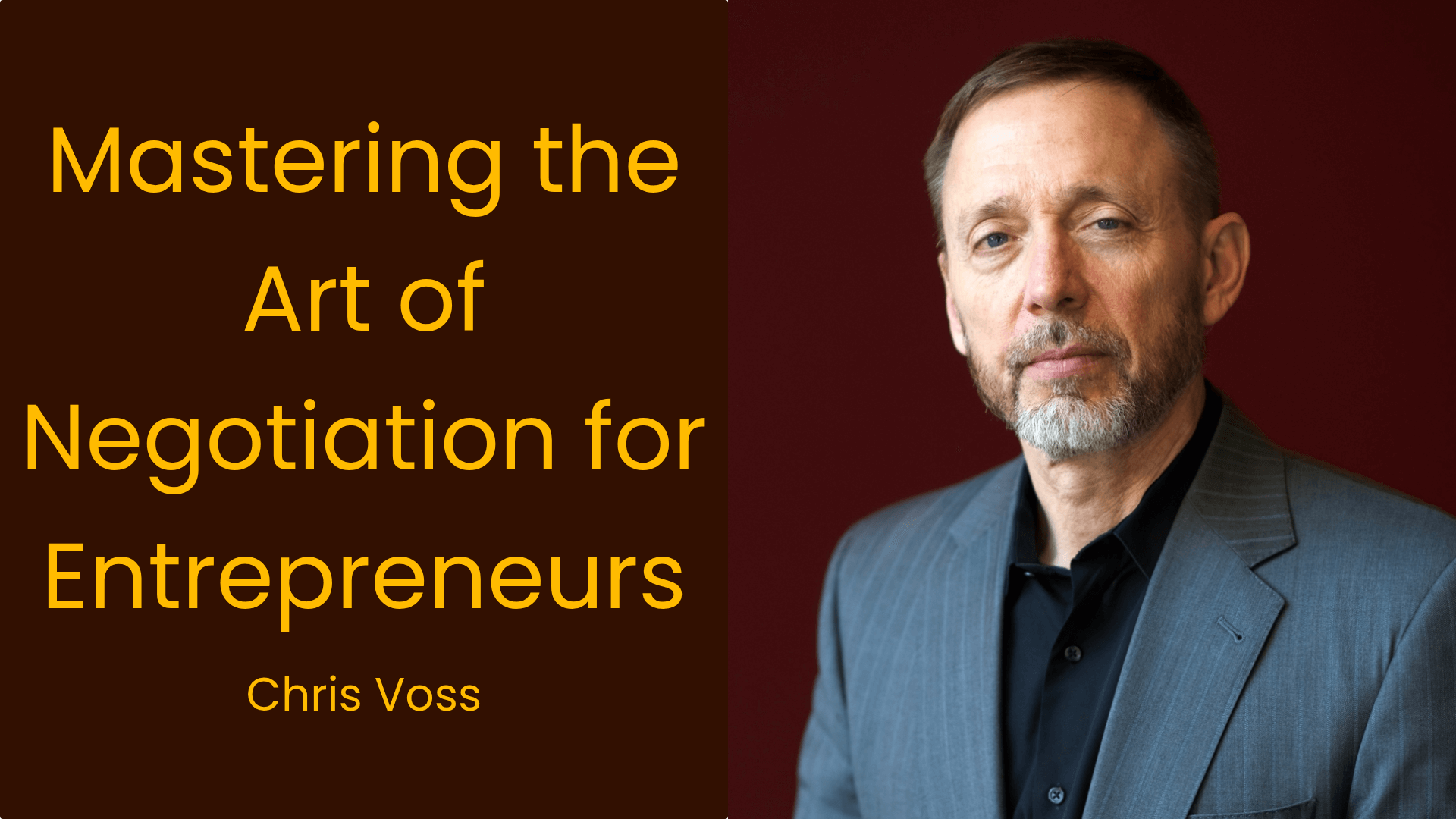Unlocking Founder Success: Negotiation Strategies from Chris Voss
Discover essential negotiation strategies from Chris Voss to enhance your founder success journey.

Unlocking Founder Success: Negotiation Strategies from Chris Voss
Negotiation is a critical skill for founders, entrepreneurs, and business leaders. In this episode, we dive deep into negotiation strategies with Chris Voss, a former FBI negotiator and expert in the art of negotiation. Chris shares his insights on how to leverage negotiation techniques to foster better relationships and achieve successful outcomes. This article distills key takeaways from our conversation, highlighting frameworks and actionable strategies for enhancing your negotiation skills, ultimately leading to greater founder success.
The Power of Listening in Negotiation
Let the other side go first. The real challenge comes at step two. — Chris Voss
Why it matters: Effective listening is often overlooked in negotiation, yet it can significantly impact business outcomes. By allowing the other side to express their thoughts fully, you can gather valuable information and build rapport. According to studies, negotiations that emphasize active listening lead to higher satisfaction and better long-term relationships. For example, Chris recounts a scenario where he made a bride feel understood during a wedding reception, resulting in a lasting bond that exemplifies the importance of listening.
How to Enhance Your Listening Skills
- Focus entirely on the speaker without preparing to respond.
- Acknowledge emotions by validating their feelings.
- Avoid interrupting; let them finish their thoughts.
- Summarize what they’ve said to ensure understanding.
- Ask open-ended questions to encourage further dialogue.
Building Trust through Tactical Empathy
Your objective is to have a long-term relationship of trust where we both prosper. — Chris Voss
Why it matters: Trust is the foundation of any successful negotiation. By employing tactical empathy—understanding the other party’s perspective—you can create a collaborative environment. Data shows that negotiations characterized by trust lead to more favorable outcomes for both parties. Chris emphasizes that even in high-stakes scenarios, such as hostage negotiations, establishing trust can be the key to success. For instance, he shares how understanding the emotions of a hostage-taker led to a peaceful resolution.
Strategies for Building Trust
- Identify and acknowledge the other party’s concerns.
- Share your own vulnerabilities to foster openness.
- Use labels to reflect their emotions back to them.
- Establish common ground before diving into specifics.
- Be consistent in your communication and actions.
Negotiation as a Collaborative Problem-Solving Process
The adversary is a situation, not a person. — Chris Voss
Why it matters: Viewing negotiations as collaborative rather than adversarial can lead to better outcomes. This approach encourages parties to work together to solve problems rather than compete against each other. Research indicates that negotiations framed as joint problem-solving often yield more satisfactory results. Chris illustrates this with the example of a bank robbery negotiation, where by reframing the dialogue, both sides could work towards a solution rather than digging in their heels.
Transforming Your Negotiation Mindset
- Define the problem clearly with both parties involved.
- Brainstorm solutions together, valuing each input.
- Focus on interests, not positions, to uncover underlying needs.
- Create win-win scenarios that benefit both sides.
- Document agreements to ensure accountability.
Avoiding Compromise: Striving for High-Value Trades
Compromise is correlated with mediocrity. — Chris Voss
Why it matters: Compromise often results in suboptimal outcomes for both parties. Instead, seeking high-value trades can lead to better solutions that leverage the strengths of both sides. The concept of high-value trades emphasizes the importance of creativity in negotiations. Chris highlights instances where parties focused on their respective needs rather than split the difference, resulting in more innovative and satisfactory agreements.
How to Achieve High-Value Trades
- Identify your non-negotiables and priorities.
- Understand the other party’s bottom line and interests.
- Propose creative alternatives that meet both sets of needs.
- Be willing to walk away if a satisfactory agreement isn’t reached.
- Revisit the negotiation after cooling off if needed.
The Role of Preparation in Negotiation Success
What negatives are you likely harboring about me? — Chris Voss
Why it matters: Preparation is crucial for successful negotiations. By anticipating the other party’s concerns and objections, you can address them proactively. Studies show that well-prepared negotiators are more likely to achieve favorable outcomes. Chris shares his method of identifying potential negatives before negotiations, which allows him to approach discussions with greater confidence and clarity.
Steps for Effective Negotiation Preparation
- Research the other party’s background and previous deals.
- List potential objections they may have about your proposal.
- Prepare your responses to those objections.
- Set clear objectives for what you want to achieve.
- Practice your negotiation techniques with a colleague.
Conclusion
In conclusion, the insights shared by Chris Voss provide invaluable strategies for founders and entrepreneurs seeking to enhance their negotiation skills. By mastering the art of listening, building trust through tactical empathy, viewing negotiations as collaborative problem-solving, avoiding compromise in favor of high-value trades, and preparing thoroughly, business leaders can significantly improve their outcomes. These principles not only contribute to successful negotiations but also foster lasting relationships that are essential for long-term founder success. As you embark on your journey, remember that negotiation is a skill that can be honed with practice, and by employing these strategies, you can navigate the complexities of business with confidence and effectiveness.


